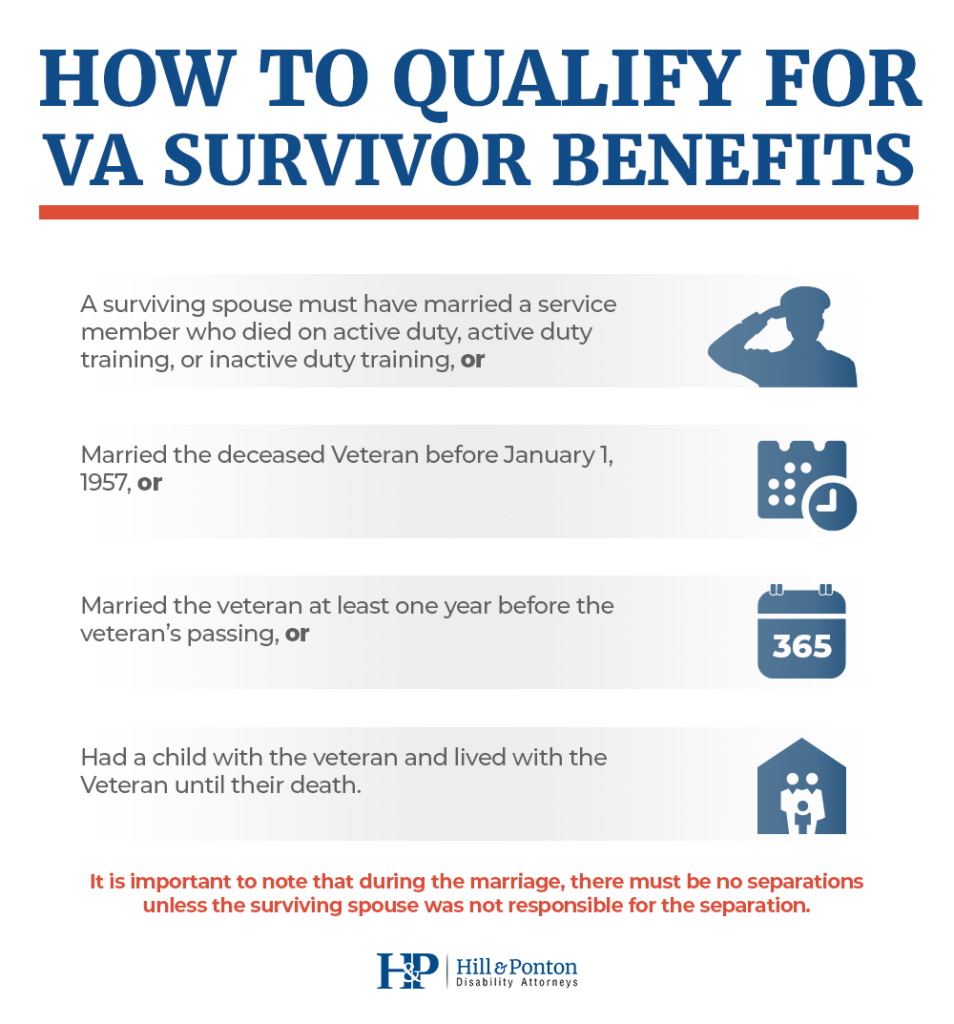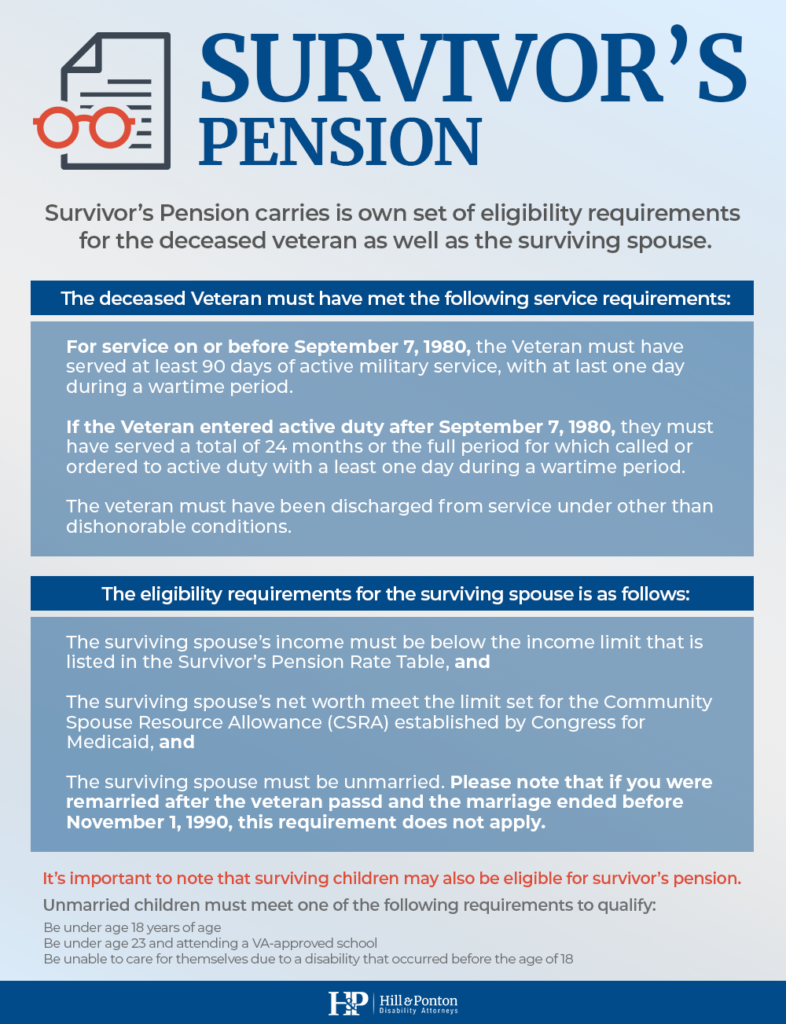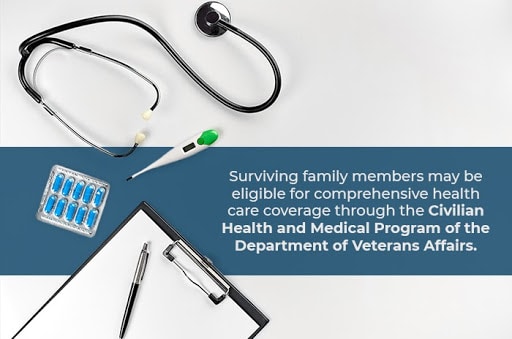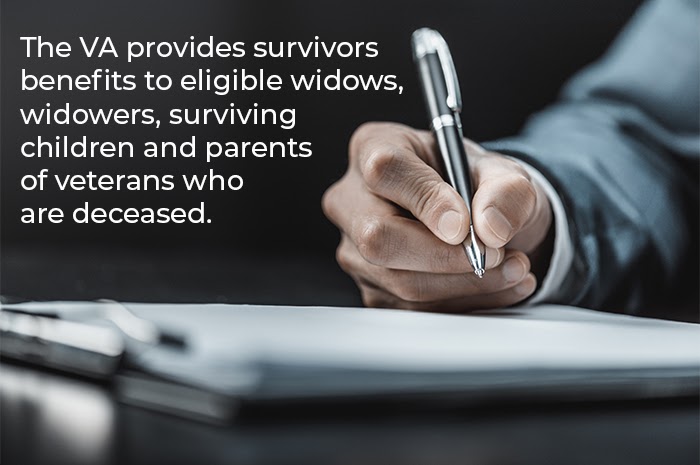Does a Wife Continue to Receive Deceased Husband s Veterans Disabilities Veterans Benefits
Losing a loved one can be extremely difficult for a Veteran's family members. This loss can also cause financial distress especially if the veteran was the sole provider. So, do widows and survivors of veterans get VA disability benefits?
Fortunately, the U.S. Department of Veterans Affairs offers several monetary VA benefits for widows and surviving spouses of wartime veterans. These include dependency and indemnity compensation (DIC benefits), survivors pension, and burial benefits.
We will be discussing the requirements that must be met to be eligible for these benefits as well as other types of benefits available through the VA such as health care services, burial benefits, and more below so scroll down!

Who qualifies for VA survivor benefits?
The VA has criteria in place to determine who a veteran's surviving spouse is and who can qualify for VA survivor benefits. There are several requirements that spouses of veterans must meet to be eligible for DIC. The requirements are as follows:
- A surviving spouse must have married a service member who died on active duty, active duty training, or inactive duty training,or
- Married the deceased Veteran before January 1, 1957,or
- Married the veteran at least one year before the veteran's passing,or
- Had a child with the veteran and lived with the Veteran until their death. It is important to note that during the marriage, there must be no separations unless the surviving spouse was not responsible for the separation.
A surviving spouse must have married a veteran who died due to a service-connected injury or disease, and the marriage must have begun within 15 years of the veteran's discharge in which caused the disability.
There is also a strict criterion for remarried surviving spouses. Usually, a remarried spouse is not eligible for DIC benefits; however, in some cases, eligibility would depend on the date of remarriage. Spouses who remarry after age 57 and remarried on or after December 16, 2003, can still be eligible to receive DIC benefits.
Dependency and Indemnity Compensation (DIC Benefits)
Dependency and Indemnity Compensation, or DIC for short, is a monthly benefit that can be paid to survivors of vets who were killed on active duty and for survivors of veterans who died from service-connected disabilities or had a 100 percent disability rating for a period of time before death. This benefit is also tax-free.
Do I get my husband's VA disability if he dies?
Veterans' disability compensation is not the same benefit as DIC. After a veteran has died, the veteran's benefits are not continued for the surviving spouse to collect. A surviving spouse should apply for DIC benefits if the veteran's death was caused by their already-service connected disability if they meet the above criteria. If the veteran died due to a service-connected disability or died in the e of duty, then the process of claiming DIC benefits should be simple.
How much are Survivor benefits from VA?
While the eligibility of DIC benefits is based on the Veteran or service member's service-connected disability, Survivors Pension is not. Also known as "death pension" by some, the survivor's pension is a tax-free monetary benefit that is payable to a low-income, unmarried surviving spouse of a deceased veteran with wartime service — the amount can vary but generally the Survivor Benefit Plan (SBP)/Minimum Income Annuity (MIW) limitation is $9,896. The pay rate for this benefit has been set by Congress.

Survivor's Pension carries is own set of eligibility requirements for the deceased veteran as well as the surviving spouse. The deceased Veteran must have met the following service requirements:
- For service on or before September 7, 1980, the Veteran must have served at least 90 days of active military service, with at last one day during a wartime period.
- If the Veteran entered active duty after September 7, 1980, they must have served a total of 24 months or the full period for which called or ordered to active duty with a least one day during a wartime period.
- The veteran must have been discharged from service under other than dishonorable conditions.
The eligibility requirements for the surviving spouse is as follows:
- The surviving spouse's income must be below the income limit that is listed in the Survivor's Pension Rate Table,and
- The surviving spouse's net worth meet the limit set for the Community Spouse Resource Allowance (CSRA) established by Congress for Medicaid,and
- The surviving spouse must be unmarried. Please note that if you were remarried after the veteran passed and the marriage ended before November 1, 1990, this requirement does not apply.
It's important to note that surviving children may also be eligible for survivor's pension. Unmarried children must meet one of the following requirements to qualify:
- Be under age 18 years of age
- Be under age 23 and attending a VA-approved school
- Be unable to care for themselves due to a disability that occurred before the age of 18
What benefits do spouses and widows of veterans get?
We will cover these more in-depth below, but spouses of veterans and widows of veterans have a number of VA benefits they may qualify for including CHAMPVA healthcare, burial benefits, monthly DIC compensation benefits, Educational Assistance, and more.
Veteran Burial Benefits
The VA has burial allowances that are paid at a flat rate. This allowance helps cover eligible Veterans' burial and funeral costs and are paid at the maximum amount allowed by law. These benefits can also cover expenses like gravesites and headstones. In 2014, VA regulation changed to help simplify the program and now, eligible surviving spouses are paid automatically for this benefit upon notification of the Veteran's death.
The good news is that the surviving spouse does not have to file a claim for this benefit or fill out any applications.
Eligibility for this benefit is as follows:
- The Veteran must have a discharge other than dishonorable.
- The Veteran's death must have been a result of a service-connected disability,or
- The Veteran must have been receiving VA pension or compensation at the time of their death.
- A veteran who has died while hospitalized by the VA or while receiving care under VA contract is eligible.
- A veteran who died under the following circumstances is eligible:
- Under proper authorization and at VA expense
- To or from a place for the purpose of examination, treatment, or care
- The Veteran must have had an original or reopened claim for VA compensation or pension at the time of death.
- The Veteran died on or after October 9, 1996, while a patient at a VA-approved state nursing home.
- The veteran was entitled to received VA pension or compensation at the time of death, but instead received full military retirement or disability pay.
Do I get my husband's VA healthcare if he dies?
Surviving family members may be eligible for comprehensive health care coverage through the Civilian Health and Medical Program of the Department of Veterans Affairs (CHAMPVA). This program helps cover medical supplies and services for surviving spouses and dependent children who don't qualify for coverage under TRICARE.
According to the VA, surviving spouses and dependent children must meet the following requirements to qualify for health care benefits:
- Be the spouse or child of a veteran who has been rated permanently or totally disabled for a service-connected disability,or
- Be the surviving spouse or child or a veteran who died from a VA-related service-connected disability,or
- Be the surviving spouse or child of a veteran who was at the time of death rated permanently and totally disabled from a service-connected disability,or
- Be the surviving spouse or child of a service member who died in the line of duty, not due to misconduct. Though, family members who meet the last requirement generally qualify for TRICARE.

Survivor's and Dependent's Educational Assistance (DEA) Program
The VA also offers educational benefits through the Survivors' and Dependent's Educational Assistance (DEA) program, which was established in the GI Bill. This program provides education assistance to eligible dependents of veterans who are permanently and totally disabled as a result of a service-connected disability.
The VA determines whether a disabled veteran's disability rating makes their dependent children and spouses eligible for these types of benefits.
Keep in mind that the VA considers character of discharge when awarding certain benefits, such as VA home loans, education benefits, and pension benefits. There is generally not a character of discharge requirement to apply for life insurance. If you were discharged under dishonorable conditions, it's important to look into the VA requirements.
VA Benefits for Dependent Parents of Veterans
For aparent to receive benefits as dependents or as a surviving parent, they have to meet two requirements. First, they have to have a parental relationship to the veteran. Second, the VA considers their financial situation. If the veteran is trying to get additional compensation for their parents, the parents have to be financially dependent on the veteran. If the parents are attempting to get DIC benefits, they have to meet the income eligibility requirements.
VA Benefits for Dependents
For a child to qualify for benefits as a dependent child or surviving child of the veteran, there are also two requirements.
- The child must be either:
- A biological child,
- an adopted child, or
- a stepchild of the veteran.
- The child must be either:
- of qualifying age: under 18, or between 18 and 23 if pursuing education, OR
- a helpless child: permanently incapable of self-support before the age of 18.

To prove a child is the biological child of the veteran, the VA usually only requires a written statement with the child's age, date of birth, and social security number. It is rare that the VA requires additional proof, but if they do it will likely be in the form of: a copy of public record of birth; a copy of baptism record; an official report from the service department that the birth occurred while the veteran was in service;
Or an affidavit or certified statement from a physician (or midwife) attendant at birth; a copy of a family record properly certified by a notary public; or an affidavit or certified statement of a disinterested person who can attest to personal knowledge of the child's biological relationship to the parents.
If the veteran was married when the child was born and the veteran is the child's biological parent, no additional proof of the relationship (other than those documents) is required. If the veteran is the child's biological mother and the child was born outside of a marriage, the same rule applies.
But if the veteran is the child's biological father and the child was born outside of a marriage, the VA will look at each individual case to determine the evidence to establish the relationship. Evidence that may be submitted includes:
- A signed statement from the veteran acknowledging the relationship,
- Evidence that the veteran has been identified as the child's father by judicial decree,
- Birth certificate listing the veteran as the child's father, or
- Any other evidence naming the veteran as the child's father and that the veteran knew of the relationship.
A child can also be the veteran's adopted child, as shown by evidence that the veteran legally adopted the child before they turned 18.
What if the veteran's child is adopted?
A child can also be the veteran's adopted child, as shown by evidence that the veteran legally adopted the child before they turned 18. Proof of this would be a copy of the adoption decree or of the adoptive placement agreement.
A child that is the biological child of the veteran's spouse, former spouse, or surviving spouse may qualify for benefits as the veteran's stepchild.
The marital and biological relationship would have to be established, and the veteran must show that the child currently resides in the veteran's household. If it is for DIC benefits, the surviving spouse must show that the child resided in the veteran's household at the time of the veteran's death.
What is "helpless" according to the VA?
The last option is what the VA calls a helpless child. This is the veteran's biological child, adopted child, or stepchild who is permanently incapable of self-support before they turn 18, either because of a physical or mental disability.
The one claiming benefits for the helpless child should submit medical or psychiatric reports and lay evidence to show the child had the incapacity before turning 18 and qualifies as a helpless child. Once the child is considered a helpless child, they remain under that status as long as they are not married, employed, or capable of self-support.
The veteran's child must be either younger than 18, or between the ages of 18 and 23 if they are "pursuing a course of education or training at an approved educational institution." The VA determines what educational institutions are approved, usually a permanent organization that offers courses of instruction to a group of students who meet its enrollment criteria, meaning schools, colleges, academies, seminaries, technical institutes, and universities.
A home school program only counts as an approved educational institution if it operates in compliance with state attendance laws. Schools outside the US may be approved if the program is offered by an institution recognized as standard and accredited.
Now that we have covered who may receive benefits in addition to the veteran, we will next look at what benefits are available to these qualifying individuals.
VA Disability Benefits for Children of Vietnam Veterans
Studies have shown that veterans who were exposed to Agent Orange are more likely to have children with birth defects, and the VA recognizes this link as well. Therefore, in certain cases, the child of a Vietnam veteran may be entitled to disability benefits in their own right.
Eligibility for Children of Vietnam Veterans
Depending on the birth defect, children of Vietnam veterans must meet several requirements to receive benefits.
For Spina Bifida
VA benefits apply to "all forms and manifestations of spina bifida, except spina bifida occulta." To receive benefits for spina bifida, the child's biological mother or father must have served in:
- The Republic of Vietnam or in Thailand for any length of time between January 9, 1962, and May 7, 1975,OR
- A unit in or near the DMZ for any length of time between September 1, 1967, and August 31, 1971
AND the child must have been:
- Diagnosed with a form of spina bifida other than spina bifida occulta,AND
- Conceived after the parent first entered the Republic of Vietnam, Thailand, or the DMZ during the qualifying time periods listed above.
Unlike claimants for other VA disability benefits, a claimant for spina bifida benefits will not have to undergo a VA medical examination unless the spina bifida diagnosis is suspect. If a potential claimant has a diagnosis of spina bifida occulta, it may be helpful to seek another medical opinion.
For Other Birth Defects
According to the VA, children of Vietnam veterans with the following birth defects may be eligible for benefits:
- Achondroplasia
- Cleft lip and cleft palate
- Congenital heart disease
- Congenital talipes equinovarus (clubfoot)
- Esophageal and intestinal atresia
- Hallerman-Streiff syndrome
- Hip dysplasia
- Hirschprung's disease (congenital megacolon)
- Hydrocephalus due to aqueductal stenosis
- Hypospadias
- Imperforate anus
- Neural tube defects
- Poland syndrome
- Pyloric stenosis
- Syndactyly (fused digits)
- Tracheoesophageal fistula
- Undescended testicle
- Williams syndrome
Note: These are some of the birth defects that children of Vietnam veterans may have that the VA covers. However, it's not a complete list, and the VA may cover other conditions as well. The VA does not cover conditions caused by birth-related injuries, family disorders, or fetal or neonatal infirmities.
To be eligible for benefits, children with the above birth defects must meet the following criteria:
- The child's biological mother served in Vietnam any time from January 9, 1962, through May 7, 1975,AND
- The child was conceived after the mother first entered the Republic of Vietnam during the time period listed above.
Applying for Disability Benefits as a dependent
To apply for benefits, claimants must fill out VA Form 21-0304, Application for Benefits for a Qualifying Veteran's Child Born with Disabilities. If a child is over 18, they must sign the form for themselves.
Source: https://www.hillandponton.com/veterans-benefits-for-widows-explained/
0 Response to "Does a Wife Continue to Receive Deceased Husband s Veterans Disabilities Veterans Benefits"
ارسال یک نظر